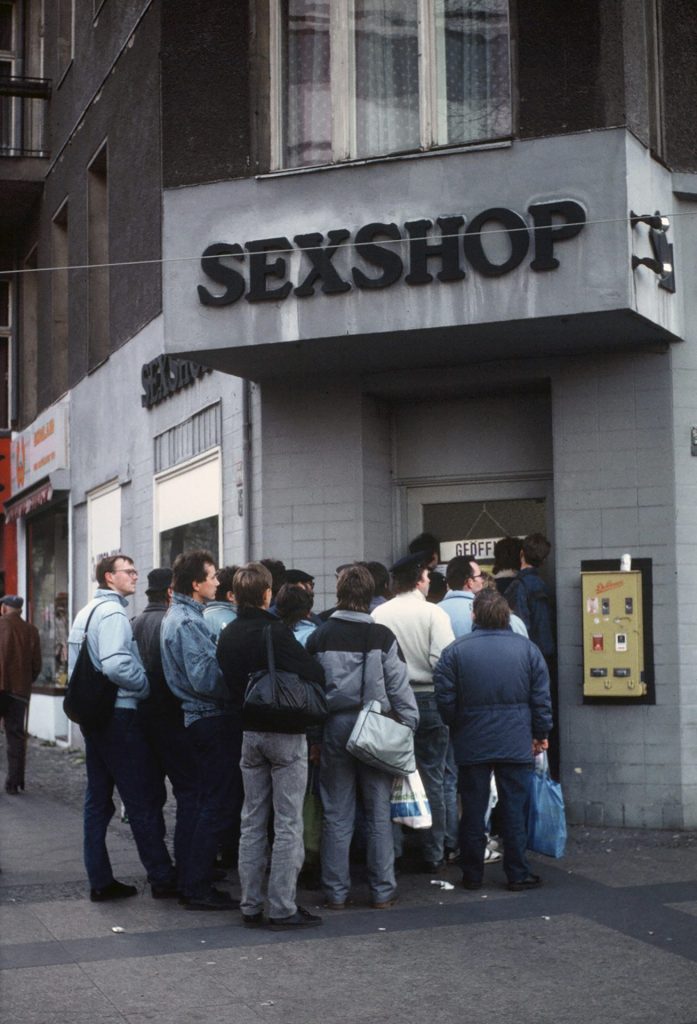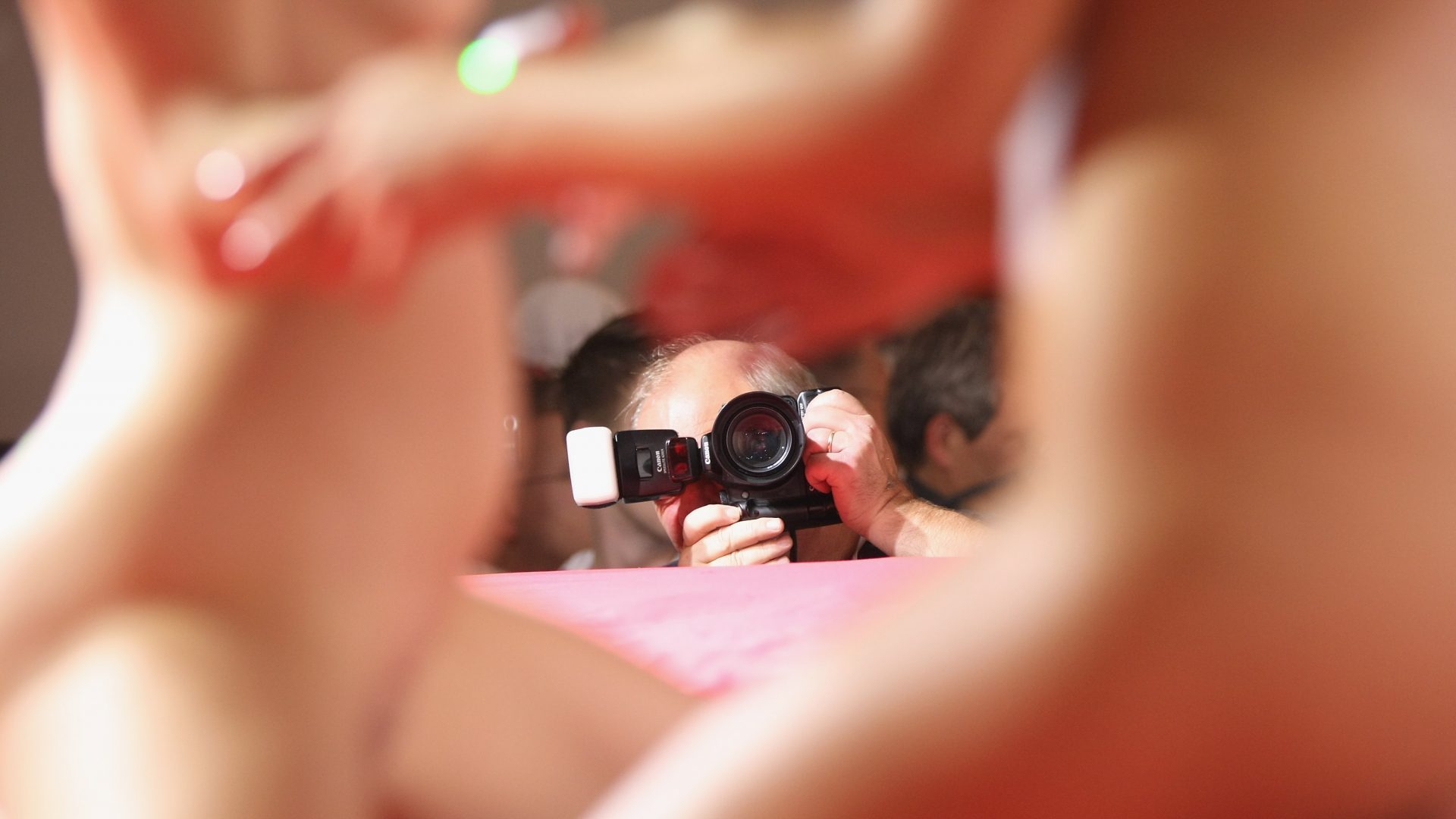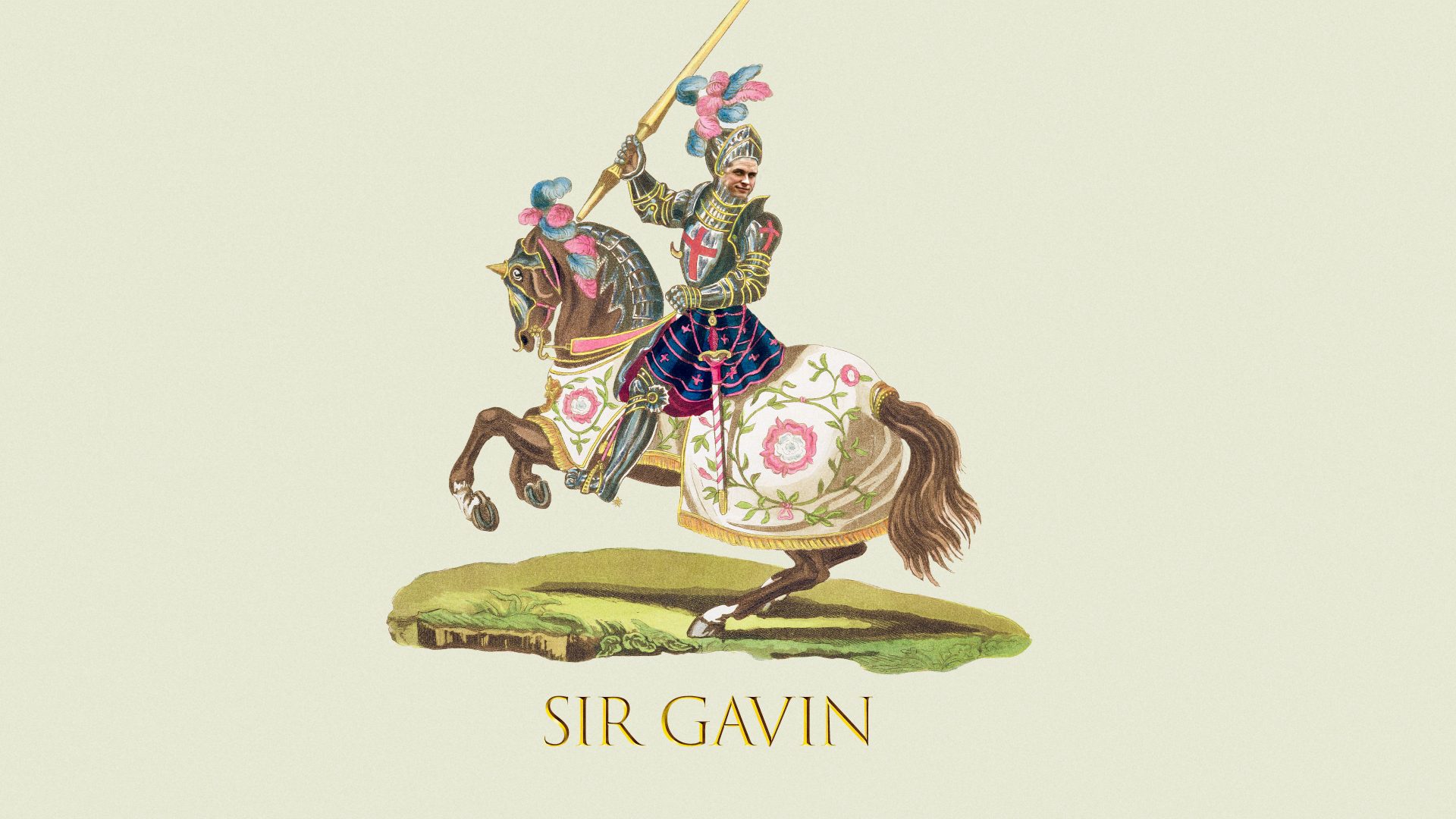It’s a fine, autumnal Friday morning and you are in central Berlin, about to enter the biggest erotic trade fair in the world. Pink flags flutter above building-sized posters of almost-naked porn stars. Strange men mill about outside. At this stage, you may – and if you are British, you definitely will – feel an awkward momentary urge to duck your head, hug your overcoat close and hope nobody notices you going into what appears to be a giant sex shop.
But then you remember. You’re in Berlin, a metropolis that has been, at various times, nominated as the most liberal, liberated, sexy and kinky city in the world, a place where the official tourism board offers visitors tips on the best fetish clubs.
You’re also in Germany, the country that invented the sex shop in 1962, opened the first institute for sex research in 1919 and founded the first gay rights organisation in 1897. Germany has also had some of the most liberal laws on prostitution since, oh, the Middle Ages and is the second-largest market for porn in the world after the US.
Even the Nazis had a permissive attitude. New York-based history professor Dagmar Herzog, author of the book Sex after Fascism, says that while the Nazis may have said they were against the excesses of the 1920s Weimar Republic – think “Babylon Berlin” – they were actually quite promiscuous – when it suited their ideology. For example, adultery between consenting Aryans was OK if it made more Aryans. Churches that preached sexual sobriety were ridiculed by secularism-promoting Nazis, who called the priests hypocrites.
Why are the Germans like this? Well, where better to find answers than at the Venus erotic trade fair, which has been an annual event for 25 years and is reputedly the biggest of its kind in the world. About 30,000 people pass through here, perusing goods and all manner of services hawked by more than 250 exhibitors from 40 different countries.
The fair took place in central Berlin over four days in late October and the first thing to say is that the atmosphere at these events is unexpectedly un-erotic. You’ll see everything from bondage starter kits to dildos and vibrators, bona fide porn stars, gimps and sex slaves. Yet oddly there’s a very German, business-like atmosphere to it all.
But maybe that’s exactly how the Germans like it: matter-of-fact and no nonsense. There’s not much titillation and certainly no shame. Just lots of different sized and shaped bodies, some of them partially undressed, and much free and frank discussion about orgasms, fisting safely and the best way to tie somebody up.
“I do think they [the Germans] are more open,” the British owners of the Nottingham-based business Black Rose World, all agree. They regularly sell their kinky wares – items like chain dresses, cuffs and leather whips – at similar events, including in the UK.
“I mean, when it comes to sex, everyone wants the same things,” says Christine, who runs the stand and has been in this trade for a decade. “It’s human nature. But here, for instance, if a woman wants to try on a [chain mail] shirt, she’ll just take everything off and try it on. They certainly don’t do that in England.”
Earlier on a young woman had indeed shrugged off her T-shirt in the middle of the trade fair. Smiling broadly into a full-length mirror, she posed in her knickers with what looked like four or five lengths of plumber’s chain wrapped around her chest. A nearby stranger took a picture with his camera phone. Nobody seemed to mind.
Perhaps the straightforward German approach to sexuality might start with naked German bodies. That’s the suggestion of Indira, a part-time stripper and organiser of sex-positive parties, who is selling a range of natural lubricants here today.
“I think it has a lot to do with the FKK [Frei Körper Kultur] movement in [the former] East Germany,” she mused. The name of the movement translates to “free body culture” and roughly equates to naturism.
“The naked body was not immediately sexualised,” Indira explained. “In fact, sex was often seen as one of way of being free from political oppression.”
Behind Indira, a short, balding, middle-aged man has decided to prove her point. He wants to try out the Naturally Naughty ginger spray she and her colleagues are selling. So just beyond a table stacked with little black flasks, he pulls down his jeans and, without fanfare or apology, bends over another counter and exposes his bottom.
While we chat about naturism, Indira’s colleague lightly mists the man’s buttocks with ginger spray, then smacks his blushing cheeks with a broad wooden paddle that looks a lot like your average breadboard. The pot-bellied chap looks over his shoulder, nods and grins. It stings, yes, but in a good way. He pulls up his pants and purchases a bottle.
“There’s no kink shaming here,” Indira says, smiling. “Only respect and trust.”
The same kind of matter-of-fact scene is repeated all over the Venus fair.
Two gimps head to toe in black shiny vinyl stroll by with takeaway coffees. One of them has the most incredible thigh-high boots and the other, an upsettingly bulging, shiny vinyl-covered crotch.
A woman leads her boyfriend around on a leash; apart from the collar and chain, they are wearing everyday clothing and discussing what to look at next. On this particular day, there is also a man walking around dressed as a giant banana.
And every now and then, Ari Denaro, the small, dreadlocked dungeon master from Berlin’s infamous 28-year-old KitKat fetish club, prances through the main hall, five subjugated young women in various degrees of undress harnessed behind him. He wears a vest advertising the KitKat Academy, which offers bondage workshops. Earlier the performer, who is also known (non-ironically) as the Kamasutra Ninja, gave a talk on sexual domination in heavily Italian-accented English.
The standard cost of entry is 55 euros and, apart from those who are dressed up, most festivalgoers actually look like your neighbours. They range from adventurous couples dressed in matching hiking jackets out to spice up their love life with a new sex toy or two, to lightly boozed friends off on a naughty adventure. It’s not all pretty though. There are also a significant number of single men of all ages, some of whom look as if they would be more comfortable watching everything from behind a bush.
There are three main halls at Venus and the most anodyne is the shopping area. Here sex-toy manufacturers display their latest creations – life-sized sex dolls that cost 2,000 euros and talk, and that you may fondle (but only with one hand safely enclosed in a single-use medical glove), as well as high-tech vibrators that shimmy, shake, suck or blow sound waves into your groin.
“It’s like your vagina is standing in front of a giant speaker,” the sales woman explains enthusiastically.
But it is in the other two halls at Venus that further clues on German sexual mores are to be found.
For one thing, sexual openness is not the same everywhere in Germany, says Lia-Amalia, a 20-something sex worker. Lia-Amalia is a cam girl, a member of one of the sex industry’s fastest-growing sectors. Cam girls are scantily dressed women of all shapes, sizes and ages who perform sex acts for paying clients via a web camera.

Several of the larger websites that host cam girls, including the unimaginatively named My Dirty Hobby, BongaCams and Strip Chat, have set up large booths in a hall dedicated to “live action”. At their booths, clients can meet their fantasies in the flesh, take selfies or collect autographs. In return, the cam girls tout for more online business.
“Berlin is totally open,” Lia-Amalia continues. “But I’m from the south and if I even wear hotpants in the summer in Nuremberg, sometimes people look at me funny.”
With that, the tawny temptress vaults nimbly on to the My Dirty Hobby counter in front of her. She bites her lip, bats her lashes and tugs suggestively at the waistband of her transparent, lilac knickers (she’s wearing underwear, makeup and Converse sneakers). Playing the startled sexpot, she is quickly surrounded by a silent gaggle of men. Most of them are armed with cameras and clearly they’re all on some sort of porn-star safari, silently hunting for that elusive crotch shot to take home. They don’t make eye contact with the posing women and tend to keep the camera between themselves and the objects of their grubby affection. There’s a slightly sleazier, transactional feeling to all this and, along with it, the first whiff at Venus of what feels like shame.
A young man wearing traditional Bavarian lederhosen watches from nearby. Although some have been known to find lederhosen stimulating, his embroidered knickerbockers are not a kink, he explains. “I come [to Venus] every year wearing this and it’s actually just a bit of a joke,” he says.
He reckons that German sexual openness is regional, which confirms Lia-Amalia’s theory. “Bavaria is more rural. It’s not so open and it’s much more religious, much more Christian,” he says. “Which makes everyone more uptight.”
A 2021 survey found that only around a third of Germans say religion is important to them, but Bavaria remains one of the most religious parts of the country. In fact, the further east you go, the less religious Germans get. Just like the FKK, this too may be a hangover from the country’s Communist-ruled times, when the East was officially atheist.
Research shows that being religious often goes hand in hand with more sexual shame and less sexual satisfaction. And this might also be why, to this day, Germans from the former East Germany will tell you that although they may not have had genuine Levi’s or enough fruit in their supermarkets, they had better sex than their compatriots in the West.
East Germany under Communist rule was known for the way it supposedly treated men and women more equally. Despite being one of the most politically oppressed states in the world at the time, it was allegedly very sexually progressive. Sex before marriage was not taboo (even though prostitution and pornography were) and post-cold war studies even suggest that women in eastern Germany had more orgasms than women in western Germany.
The theory remains disputed but in her book, Why Women Have Better Sex Under Socialism, the American anthropologist Kristen Ghodsee explains why it might be true. In a more socialist society, females could be more economically and therefore sexually independent, while capitalism commodified sex, exploited relationship anxieties and made sex into a climaxing contest, she argues.
Anyway, if the live action hall at Venus was more Bavaria, all about objectified women and sexual shame with long lenses, then the next hall is more like sexually progressive, socialist Berlin.
In the Kink arena, you’ll find everything from ball gags – “we’ll make you speechless” is the manufacturer’s boast – to lengths of silky cotton rope for tying your partner up Japanese bondage style, handcrafted leather masks that wouldn’t look out of place in a Tim Burton movie and bespoke, fur-lined cuffs and collars for your luxury-loving slave. There’s even a woman dressed in a nurse’s outfit who calls herself the “fisting sister” and offers a kind of medical fantasy around that particular sexual practice.
Handmade wooden dildos and wooden paddles for spanking, complete with Dad jokes, appear to be a popular item at Kink this year. “Trust is good,” says one. “Being chained up naked is better.”
There’s also a stage where experts like the Kamasutra Ninja teach bondage techniques, the fisting sister gives a live demonstration (complete with volunteers from the audience) and the first politically correct porn film made with German government funding is screened. But right now, in a corner of the room, two sex therapists are gyrating their hips in front of an audience of three. They are giving a workshop about “female self-love”.
“I believe how open a society is about sex is about how feminist it is,” says Mara Stadick, a sexological bodyworker and co-author of the book, Orgasmic Woman, after she stops swivelling.
A number of scientific studies would appear to support this theory. The argument goes that the more knowledgeable and positive a woman is about her own body, the less she prizes male satisfaction over her own and the more she rejects gendered double standards, the more likely she is to have “sexual power”.
“It’s also about how they teach about sex in schools,” Stadick’s colleague, Vivien Schlitter, also a somatic sex educator, added. They have been campaigning for the use of anatomically correct models of the vulva in schools. “We don’t want any shame any more,” they both agreed.
Since the late 1960s, when Germany’s first postwar generation – known as the 68ers – sparked a political change that still resonates today, sex education here has instilled a tradition of what researchers call “Verhandlungsethik” or ethical negotiation. This is basically all about informed consent and “sexual self-determination”, with popular educators in the 1970s saying that if you knew what informed consent was and you could take responsibility for your own sexual health and contraception, then you were ready. The age of consent in Germany is 14, among the lowest in Europe.
“It’s also all about the law here,” adds a woman known as Dominique Insomnia. She owns Insomnia, another well-known Berlin sex club, established in 2006, that describes itself as a “hedonistic nightclub”.
It is Dominique’s business that hosts the stage in the Kink hall and the sex therapists’ talk, and she bustles around the hall, a sex matriarch in a black corset and long black skirt.
“[At Insomnia] we offer a hedonistic parallel universe,” she continues poetically. “We’re a place for awakening.”
Thankfully German law recognises this, Dominique says, explaining that Germany’s highest court has clarified that a sex club, where consenting adults meet and fornicate, is not subject to the same sorts of laws as a brothel. Misunderstandings about what kink, fetish and swinger clubs are have caused problems for UK-based parties like Klub Verboten in the past. Not so in Germany. “It’s clear that I am not selling sex and German law confirms this,” Dominique says proudly.
“We Germans really are the freest of them all,” she boasts. “I mean, you should see when Americans first come into the club. Their eyes are like this,” she says, drawing a circle with her forefinger. “We always forget that in some countries, you can be prosecuted just for going topless.”
The upright legal status of swingers’ clubs, naked German grannies by the seaside, ethical negotiations, feminism, free love, communism, socialism, Bavarians and a fisting sister: one would be forgiven for being slightly overwhelmed by all the different theories on why Germans are more open about sex. And it is hard to say which, of all the theories that the friendly Venus attendees have proffered, is the reason.
That’s because there is no easy answer, confirms Lutz Sauerteig, a cultural historian at Newcastle University who is originally from Germany and has been researching the history of sex and sex education in his homeland for around two decades now.
“I’m reluctant to generalise because you have all kinds of different Germans. But I think what we can say is that, in general, German culture is more sexually relaxed than, say, British culture,” he explains. “You know, as has been said before: in Britain we have hot-water bottles; on the continent, they have sex.”
Sauerteig agrees, more or less, with most of the theories being bandied about here today. Each of them feeds into German culture around sex in some way, he says.
But, he suggests, one may well be more important than the others – and that is the no-nonsense attitude to non-sexual nudity. Many young Germans will regularly have seen their parents naked and in saunas. In the city or country, luxury upmarket gym or rural sweat lodge, it is frowned upon to enter in anything more than a towel.
“That’s a significant difference [to Britain],” Sauerteig says, noting that in the former East Germany, being naked on the beach was also a statement of political protest, one of the only ways that citizens there felt they could be free.
“Then of course, you also have to ask where that came from,” he continues. “Was it the ‘life reform movement’ around the 1900s that set the tone?” This is a reference to the Lebensreformbewegung, a movement that arose in Germany in the second half of the 19th century in opposition to industrialisation. Advocates emphasised a return to nature, self-empowerment through regular exercise including yoga, lashings of sauna, turning vegetarian, breakfasting on Bircher muesli and wearing Birkenstocks everywhere.
“Or was it the more relaxed culture in the 1920s Weimar Republic?” Sauerteig asks, “or was it from the Nazi period, where despite all the restrictions, the Nazis were pro-procreation for those who were considered racially valuable? You see that aesthetic in Leni Riefenstahl’s films,” he notes. “Basically, I’m not sure if you can really nail this one down so neatly.”
As good old Karl Marx, who was cited for disturbing the peace when he was a hard-partying student in Berlin in the 1830s, once said: “Men make their own history, but they do not make it as they please; they do not make it under self-selected circumstances, but under circumstances existing already, given and transmitted from the past.”
Clearly the same goes for the sexual attitudes of a nation.
Cathrin Schaer is a journalist based in Berlin who has worked for Spiegel Online and Handelsblatt



